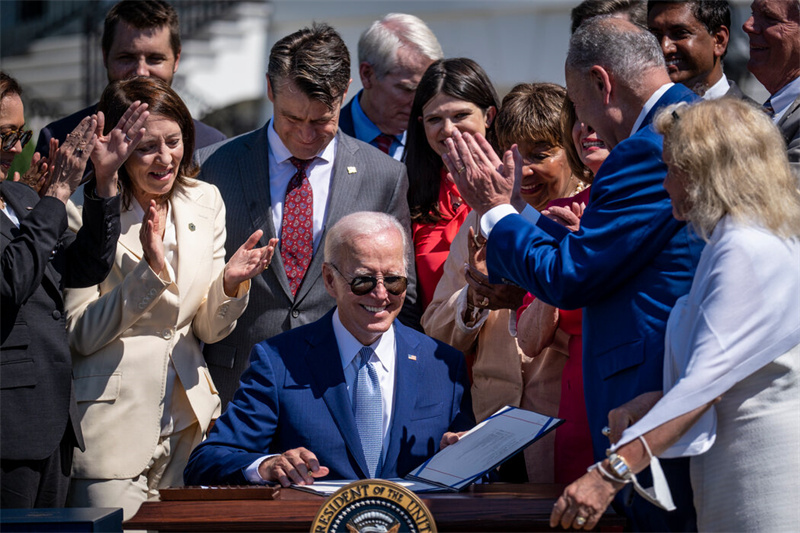In a series of announcements on December 20, 2024, the Biden administration revealed significant funding initiatives under the CHIPS and Science Act, aimed at bolstering semiconductor manufacturing in the U.S. The Commerce Department will provide substantial subsidies to Samsung Electronics, Texas Instruments (TI), and Amkor Technology Arizona, further enhancing the nation's semiconductor ecosystem.
Samsung Secures $4.745 Billion for Expansion
Samsung will receive up to $4.745 billion from the U.S. Commerce Department to support its investment of nearly $37 billion in expanding its semiconductor operations in the U.S. This funding will help transform existing facilities in Central Texas into a comprehensive ecosystem for developing and producing leading-edge chips. This includes two new logic wafer fabs in Taylor and a dedicated R&D facility, along with an expansion of Samsung's current Austin plant. The project will generate approximately 12,000 construction jobs and 3,500 permanent manufacturing roles within the next five years.
Gina Raimondo, U.S. Secretary of Commerce, praised the deal, calling it a monumental achievement that ensures the U.S. remains the only country hosting all five major semiconductor manufacturers. The investment will secure a stable supply of advanced chips critical for artificial intelligence and national security. "This is a win for American innovation, job creation, and global competitiveness," she said.

Texas Instruments Awarded $1.61 Billion for New Facilities
Texas Instruments, a leader in analog and embedded semiconductor manufacturing, will receive up to $1.61 billion in subsidies under the CHIPS Act to support its $18 billion investment in three new advanced semiconductor facilities. Two of these will be located in Texas, with another in Utah. These facilities will focus on producing "foundational" chips that power a wide range of electronic systems, from medical devices to automotive technology. This initiative is expected to create over 2,000 manufacturing jobs and thousands more in construction and support industries.
TI's expansion is critical to meeting the demand for current-generation semiconductors, which became particularly evident during the COVID-19 pandemic when supply chain disruptions threatened national security. The U.S. government's support is aimed at strengthening economic and national security by ensuring these key components are produced domestically.
Amkor Receives $407 Million for Advanced Packaging Facility
The U.S. Commerce Department will also provide $407 million in direct funding to Amkor Technology, a leading semiconductor packaging company. The funding will support the construction of a $1.7 billion advanced packaging facility in Peoria, Arizona, designed to meet the growing demand for AI and high-performance computing chips. Amkor's facility, which will be adjacent to TSMC's Arizona fab, is expected to create 2,000 permanent jobs and 2,000 construction jobs.
Amkor's advanced packaging technology is critical to the future of semiconductor manufacturing, as it supports the most cutting-edge chip designs, including 2.5D and 3D technologies. "This investment will ensure the U.S. leads the world in semiconductor packaging, strengthening the domestic supply chain and enhancing our resilience in the global market," said Raimondo.

Global Semiconductor Landscape and U.S. Strategy
These funding decisions come at a time when the global semiconductor race is intensifying. While the U.S. focuses on domestic innovation, there is growing concern over China's rise in semiconductor capabilities. U.S. Secretary of Commerce Gina Raimondo, in an interview, emphasized that the best way to stay ahead of China is by focusing on innovation rather than trying to hinder the country's progress with sanctions and bans. "We need to run faster and out-innovate them," she said, stressing the importance of investing in U.S. domestic infrastructure, like the CHIPS Act, over export controls.
Despite U.S. efforts to apply export restrictions, many Chinese companies have found ways to procure banned chips through black-market channels. Nevertheless, Chinese innovation continues to thrive, with businesses finding creative ways to work around U.S. sanctions.
The push for innovation is echoed by President Biden’s administration as well as potential future policies under President Trump, who is expected to return to the White House in 2025. While Trump has expressed opposition to the CHIPS Act, his economic policies include tax cuts and deregulation, with an emphasis on creating incentives for large-scale domestic investments.
Conclusion
The Biden administration’s substantial investments in the semiconductor industry represent a strategic move to ensure the U.S. remains at the forefront of technological advancement. With significant subsidies directed toward Samsung, TI, and
+86 191 9627 2716
+86 181 7379 0595
8:30 a.m. to 5:30 p.m., Monday to Friday
